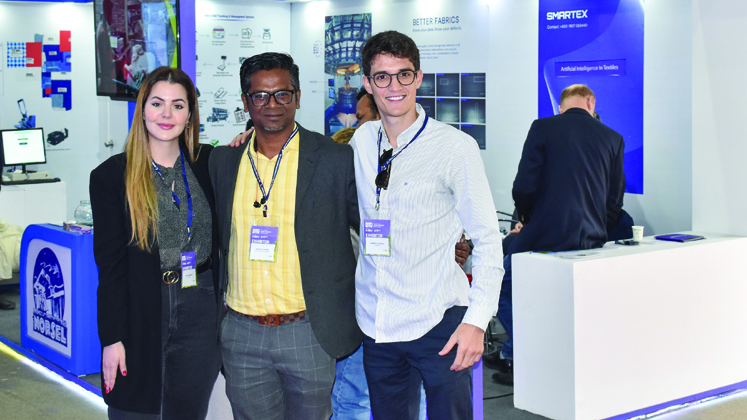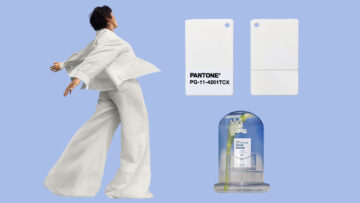
The textile industry has always been a vital part of the global economy and it continues to thrive with advancements in technology. One area where technology is making a significant impact is in the knitting division of textile mills which has witnessed the evolution of high-gauge knitting machines over the years. However, unlike apparel manufacturing shopfloor, the use of Internet of Things (IoT) in knitting units is still not normalised, the primary reason being the lack of proven technology’s intervention in the knitting industry. This is also one of the reasons behind 92 million tonnes of textile waste being created annually!
Why do these knitting/textile units need IoT or connected technology? Here is the simple answer – Textile units are still very fragmented in their processes and IoT and connected sensors can help mills identify hidden losses, resulting in improved process visibility, efficiency and waste reduction.
Smartex – a Portugal-based technology provider – not just sensed this gap but also came up with a breakthrough camera technology that works on an IoT network and leverages the use of Artificial Intelligence and Machine Learning to connect knitting machines together so that the machines can communicate with each other and data of defects can be gathered in real-time for further analysis. The company aims at positioning itself as a ‘quality platform’ for the textile industry, while aggressively working on its mission to make textile factories produce fabrics with ‘zero waste’ in a more transparent and correct way.
While the concept looks lucrative, the exclusive interaction of Team Apparel Resources (AR) with Gilberto Loureiro, Co-founder of Smartex and Camila Panizzi Luz, Head of Marketing Operations of Smartex in Dhaka was even more thought-provoking. Smartex has recently forayed into the Asian market and has received great response from countries like India and Bangladesh.
Commenting on the thought behind expanding into the Asian market, especially Bangladesh and India, Gilberto averred, “We can’t be developing a technology just for two or three customers in Europe! We want to create a real impact in the textile industry and, for that to happen, we need to scale up our operations and create a solution for a broad type of customers. Though we started in Europe, from the beginning of our business, we were always designing solutions to be scalable worldwide. And it’s inevitable for us to come to Asia as over 80 per cent of the textile industry has a base here.”
-
Smartex plays along with its strength in innovation to uplift Bangladesh’s textile industry in a sustainable way
It’s a fact that the textile industry, unfortunately, is one of the industries with less capital invested in technology and one doesn’t see many ventures’ capital investment in start-ups in the industry. The reasons are many – its manufacturing is complex; procuring of its raw material is difficult; and it’s not easy for the companies to have software for inspection or for automation. Moreover, another prevalent issue with the textile industry is that the challenges in its supply chain are very subjective. All these factors create a whole different layer of collective complexity. When it comes to Bangladesh, it’s still a new destination in the textile business comparatively, and poses a huge scope for improvement within its textile supply chain.
“Bangladesh’s textile industry is increasingly becoming a great market but the required tech-intervention is still not there. Plus, there is a lack of traceability and digitalisation. When we started with quality control systems, we went immediately for developing other automation insight-gathering tools such as product line automation and digital factory tools. Now that we have run many pilots in the country, we have a substantial number of customers in the country asking us for more ideas, automation and efficiency tools in their knitting business,” elaborated Gilberto.
Since data is captured through sensors, the technology network has to be a robust system that helps capture real and validated data. This is where Smartex has an edge in what can be said to be an industry where no major players are competing in the similar segment. The technology helps textile factories identify inefficiencies, defects and losses – all in real-time, and results in boosting the gross margins of the factories as well as drastically reducing the wastage rate.
“That’s what every fashion brand wants – a systemised and transparent process in their vendor units. Since the focus on sustainability has increased, the brands aim at fetching data from their vendors as to how they are performing on water consumption front, what kind of eco-friendly processes they have opted for, what technology have they integrated to make their process visible to all stakeholders and what are their efforts to reduce waste in the manufacturing process. Bangladesh is dominantly working on all these parameters and that’s why we are positioning ourselves as a ‘data harvesting and data sharing platform’ in the country,” mentioned Camila.
Smartex systems detect a wide range of defects, both visible and challenging or impossible to catch through the human eye. These include elastane dashes, broken elastane, sinker, thick yarn, thin yarn, oil, hole, needle and more in fabrics such as Single Jersey; Interlock; Pique; French Terry; Conventional Cotton; Organic Cotton; Lyocell; Viscose; Polyester; 100% or blended (with or without elastane); Raw Yarns; Dyed Yarns; and Melange Yarns etc.
-
Smartex prioritises ‘Right Mindset’ over ‘Size of Factories’ to tap new customers
Smartex believes it’s a company that aims at creating an impact directly in the bottom line through positive disruptive technology and it’s cautious when it comes to selecting factories as customers. The majority of the textile factory owners refrain from trying new innovations, despite having investment capacities. This segment is something Smartex isn’t looking to tap, rather it prefers factories that have the right mindset and have the right strategies, driven by technology, for long-term growth and business sustainability.
“We don’t really take the size of the company as the main aspect. Sometimes we come across massive factories but they are the last ones to invest in the technology! On the contrary, we sometimes start with a small-scale factory as they have the right mindset towards quality and zero waste. So, we identify those players who are the early adopters of new technologies and we start with them. There are a lot of such factories in Bangladesh that put innovation at first place irrespective of their size or scale,” asserted Gilberto, adding, “Usually, we select key customers in the market and we start pilot projects in their premises to show them the ROI and the payback.”
As per Smartex, so far, the company has started over 50 pilot projects worldwide, including those in Bangladesh and none of them failed. “We mainly started piloting with textile factories in Turkey and gradually moved to countries like Bangladesh, India and Pakistan. We are starting now in Brazil also. It wasn’t easy to accurately execute our pilot projects but then we saw drastic reduction in waste and increase in productivity that boosted our confidence to expand our efforts,” commented Gilberto.
-
The future looks bright for Smartex in Bangladesh and South Asia
As the textile industry is further slated to grow in South and South East Asia going forward, Smartex believes it’s the right time to strengthen footprints in countries like Bangladesh, Indonesia, India, Thailand and Vietnam among others. As an early entrant in the Bangladeshi market, Smartex banks on collaboration with its local dealer Norsel Asia that’s being run by Shawkat Ahmmed. Smartex and Norsel Asia marked their first collaborative presence in the recently concluded DTG ’23 in Dhaka where they were able to receive positive response from the visitors.
Furthermore, the market currently doesn’t see any competition in the type of technology that Smartex has developed but Gilberto accepts the fact that a lot of technology providers may enter the unsaturated textile market soon that will only enhance the quality of technologies. “Though there may be potential competition in the market soon, we are not so much concerned with the competition. We are concerned about our mission which is making factories produce with zero waste,” concluded Gilberto.








